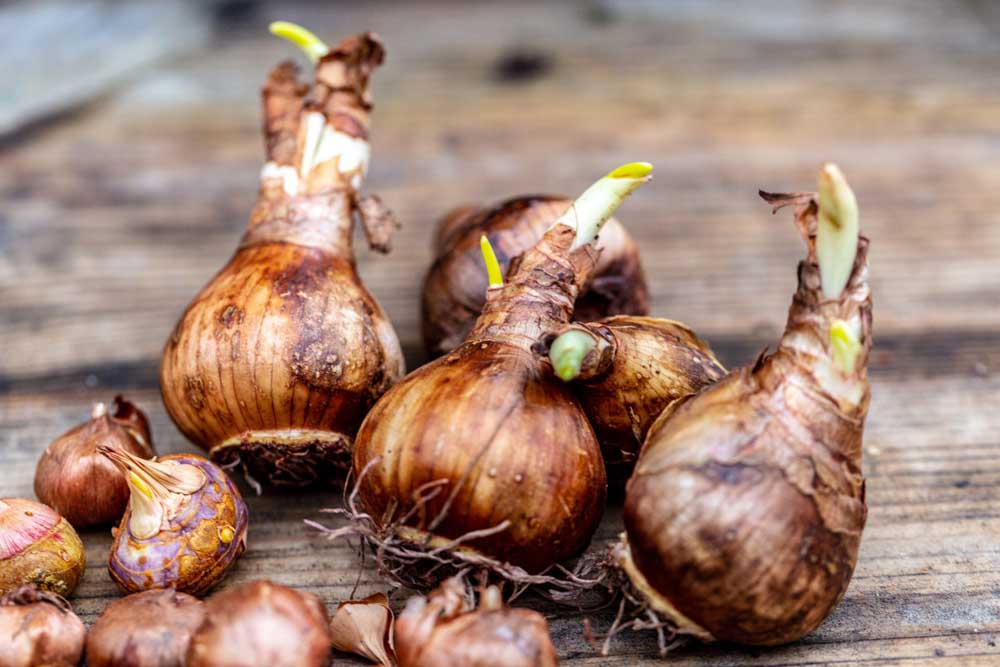Gardening corner: Mulch to talk about
Published 4:00 am Sunday, May 21, 2023

- Daffodil bulbs. There's a trick to getting bulbs to restart.
Two of the most valuable garden tools right now are a soil thermometer and a vegetable seed germination chart. The soil temperature in my area of east Bend has been registering at 50 degrees F. Readings should be taken in the morning at approximately the same time and should be consistent over at least a week.
You might be surprised to learn the vegetable seeds that germinate at the minimum of 40 degrees F. The list includes: beets, broccoli cabbage, carrots, cauliflower, Swiss chard, lettuce, onion, parsley, parsnips, pea, radish, spinach, and turnip. Germination will be quicker as the soil temperature reaches the optimum soil temperature of 50 degrees F.
Beans, corn, cucumber, melons, peppers, pumpkin, squash, tomato, turnip and watermelon need a minimum soil temperature of 60 degrees F to germinate. The optimum soil temperature is closer to 70 to 75 degrees F. Oregon State University publication EM9128, Growing Vegetables in Central Oregon is a valuable resource.
Until the night temperature stabilizes, keep the row cover handy after germination.
Till we meet again
If you are feeling overwhelmed that you haven’t prepared your garden beds, take heed. The age-old tradition of tilling the soil in the spring is being challenged. The days of bragging how hard you have worked aerating the soil to be sure the weeds are chopped, then mixing in organic material, and then the fertilizers, plus all the other products that someone claims to be the “best thing ever” are over.
Tilling is suppose to kill weeds. While the intention sounds honorable, in reality more harm than good is done. At the same time weeds are killed, weed seeds buried deep within the soil are stirred awake. These seeds have laid dormant waiting for light and air which is just what tilling has done.
Studies by the U.S. Department of Agriculture advocates that weeds are most easily and effectively eliminated by using mulch or a sharp hoe. Larger weeds will become fewer if hoeing is done regularly, making sure the root mass is pulled out of the soil.
An organic mulch, homemade or commercial, not bark mulch, offers many benefits. The mulch acts as a slow-release fertilizer, improves water-holding capacity and moisture conservation, plus promotes increased microbial activity (which helps suppress disease) and aids in root growth.
It is best to apply composted mulch no deeper than 2 to 4 inches and be sure to keep tree trunk flare and the root crown free of mulch. Over-application can lead to problems of excessive moisture and potential root rot. Mulches should be applied after the soil has warmed. If applied too early the cold air will be held in the ground.
That’s not to say that soil tilling doesn’t have value. Tilling might be the best way to incorporate air into really heavy, sticky clay soil, or heavily compacted soil on a construction site. For the most part Central Oregon gardeners should cross that chore off the spring to-do list.
Blooming bulbs
Care of spring blooming bulbs has also undergone changes over the years. The tradition for years was after the spent flower and stalk were cut, the foliage was artfully folded in half and tied with twine, or the foliage was cut in the shape of a fan.
Somewhere along the way horticulturist shared the natural process of how the bulb is energized. The natural die-back is actually adding energy to the bulb for next spring. The die-back takes awhile so many gardeners plant perennials in front of a bulb bed to camouflage the dying bulb foliage. My neighbor provides eye-candy for all of us to enjoy by cultivating daffodils — approximately 800 bulbs.
Active landscapes
Many gardeners agree that we are about a month behind in the budding out of our landscapes. With that in mind, we probably have fewer birds and bees around without the pollinating plants being available. My repens Oregon Grape is coming into full bloom and many allium plants are ready to break bud which means I might see more activity in my landscape. I do have dandelions, important as a pollinator plant and I have no intention of spraying, digging out or cutting them.
OSU Extension June Garden Fair, 9 a.m. to 2 p.m., June 3, Deschutes Expo Center. Plants, Garden Info, Plant Clinic, Vendors. Plants can be ordered online and picked up the day of the sale. gocomga.com/2023gardenfair








